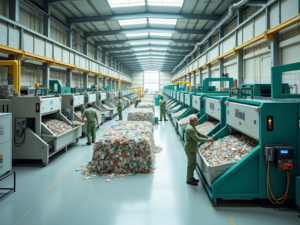Understanding Industrial License in Dubai
Dubai, a thriving business hub in the Middle East, offers various licenses for entrepreneurs and businesses to operate legally. Among these, the industrial license plays a crucial role for manufacturers, producers, and factory operators. This license allows businesses to set up and operate an industrial facility in Dubai, enabling them to produce goods and contribute to the economy. In this article, we will delve into the significance, application process, and advantages of obtaining an industrial license in Dubai.
What is an Industrial License?

An industrial license in Dubai permits a company to engage in manufacturing and industrial-related activities within the emirate. This type of license is specifically designed for businesses involved in the production of goods, including items ranging from textiles to machinery. To qualify for an industrial license, the business must establish a physical factory space that meets all regulatory standards set by Dubai’s Department of Economic Development (DED). Obtaining this license not only enables companies to operate legally but also enhances their credibility in the competitive marketplace.
Steps to Obtain an Industrial License in Dubai

The application process for acquiring an industrial license in Dubai involves several stages. Here’s a step-by-step guide to help navigate the procedure:
- Determine your business activity: Identify the specific type of manufacturing or industrial activities you plan to undertake.
- Select a business name: Choose a unique name for your company that complies with local naming regulations.
- Prepare necessary documents: Collect all required documents, including a feasibility study, land lease agreement, and proof of investment.
- Submit your application: Apply through the DED or one of the Free Zones tailored for industrial activities.
- Obtain approvals: Await the necessary approvals from government bodies concerning safety and environmental regulations.
- Receive your license: Once all conditions are met, your industrial license will be issued, allowing you to commence operations.
By following these structured steps, businesses can navigate the complexities of the licensing process and set themselves up for success.
Holding an industrial license in Dubai comes with multiple advantages that can significantly benefit businesses. Here are some key benefits:
- Legal Compliance: An industrial license ensures that your business operates in accordance with local laws and regulations.
- Access to Local Markets: License holders can directly supply goods to the vast local market, boosting sales opportunities.
- Investment Opportunities: It opens doors for local and foreign investors looking to invest in credible industrial enterprises.
- Tax Benefits: Businesses operating in Free Zones may enjoy tax exemptions and incentives.
- Brand Recognition: An industrial license boosts the company’s image and instills confidence among clients and partners.
These advantages make an industrial license a valuable asset for manufacturers aiming to establish a strong foothold in the Dubai market.
Cost Associated with an Industrial License
The cost of acquiring an industrial license in Dubai varies based on several factors, including the business’s location, size, and sector. Generally, the expenses can be broken down into the following categories:
- License Fees: The DED charges licensing fees which can range from AED 10,000 upwards annually, depending on the activity.
- Office Space Rental: Renting industrial space incurs additional costs based on the location and size of the facility.
- Documentation Costs: Fees associated with preparing and submitting necessary documentation must also be considered.
- Other Government Charges: This may include permits, approvals, and inspections needed for operational compliance.
Before initiating the application process, it is advisable to budget for these costs to avoid unexpected financial burdens.
Conclusion
Acquiring an industrial license in Dubai is an essential step for businesses aiming to engage in manufacturing and industrial activities. It not only legitimizes the operations but also provides several benefits that facilitate growth in a vibrant market. By understanding the application process, costs, and advantages, entrepreneurs can effectively position themselves for success within the UAE’s economy. As business landscapes continue to evolve, having the right licensing can pave the way for long-term sustainability and expansion opportunities in Dubai.
Frequently Asked Questions
1. Can foreign investors apply for an industrial license in Dubai?
Yes, foreign investors can apply for an industrial license in Dubai, particularly in Free Zones, allowing 100% foreign ownership.
2. What types of businesses require an industrial license?
Businesses involved in manufacturing, production, and industrial services require an industrial license, such as factories, assembly plants, and certain types of workshops.
3. How long does it take to get an industrial license?
The processing time for an industrial license can vary, but it typically takes a few weeks if all required documents are in order.
4. Are there any regulations regarding environmental compliance for industrial businesses?
Yes, industrial businesses must comply with environmental regulations set by the Dubai Environment Authority to ensure sustainable operations.
5. What are the consequences of operating without an industrial license in Dubai?
Operating without an industrial license can lead to significant penalties, including fines, business shutdowns, and legal actions against the owners.







